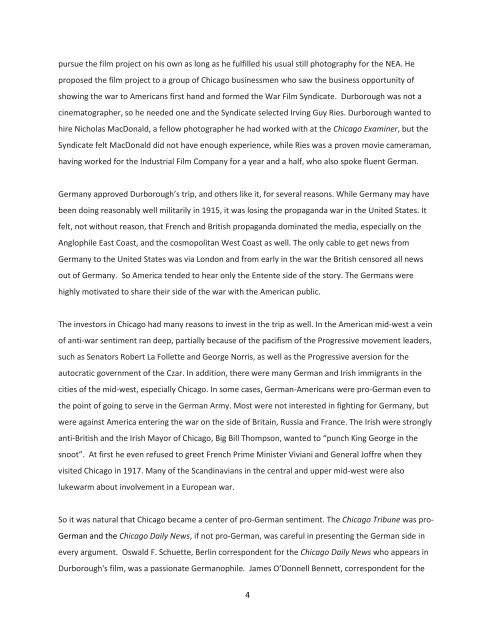"On the Firing Line with the Germans" Film Annotations (2017)
Film annotations, describing the making of Wilbur H. Durborough's World War I feature film "On the Firing Line with the Germans (USA, 1915) by authors Cooper C. Graham, Ron van Dopperen and James W. Castellan (April 2017). For more information visit our weblog http://shootingthegreatwar.blogspot.nl The movie can be watched on our YouTube channel: https://youtu.be/958QR_Cdg5U
Film annotations, describing the making of Wilbur H. Durborough's World War I feature film "On the Firing Line with the Germans (USA, 1915) by authors Cooper C. Graham, Ron van Dopperen and James W. Castellan (April 2017).
For more information visit our weblog http://shootingthegreatwar.blogspot.nl
The movie can be watched on our YouTube channel:
https://youtu.be/958QR_Cdg5U
Create successful ePaper yourself
Turn your PDF publications into a flip-book with our unique Google optimized e-Paper software.
pursue <strong>the</strong> film project on his own as long as he fulfilled his usual still photography for <strong>the</strong> NEA. He<br />
proposed <strong>the</strong> film project to a group of Chicago businessmen who saw <strong>the</strong> business opportunity of<br />
showing <strong>the</strong> war to Americans first hand and formed <strong>the</strong> War <strong>Film</strong> Syndicate. Durborough was not a<br />
cinematographer, so he needed one and <strong>the</strong> Syndicate selected Irving Guy Ries. Durborough wanted to<br />
hire Nicholas MacDonald, a fellow photographer he had worked <strong>with</strong> at <strong>the</strong> Chicago Examiner, but <strong>the</strong><br />
Syndicate felt MacDonald did not have enough experience, while Ries was a proven movie cameraman,<br />
having worked for <strong>the</strong> Industrial <strong>Film</strong> Company for a year and a half, who also spoke fluent German.<br />
Germany approved Durborough’s trip, and o<strong>the</strong>rs like it, for several reasons. While Germany may have<br />
been doing reasonably well militarily in 1915, it was losing <strong>the</strong> propaganda war in <strong>the</strong> United States. It<br />
felt, not <strong>with</strong>out reason, that French and British propaganda dominated <strong>the</strong> media, especially on <strong>the</strong><br />
Anglophile East Coast, and <strong>the</strong> cosmopolitan West Coast as well. The only cable to get news from<br />
Germany to <strong>the</strong> United States was via London and from early in <strong>the</strong> war <strong>the</strong> British censored all news<br />
out of Germany. So America tended to hear only <strong>the</strong> Entente side of <strong>the</strong> story. The Germans were<br />
highly motivated to share <strong>the</strong>ir side of <strong>the</strong> war <strong>with</strong> <strong>the</strong> American public.<br />
The investors in Chicago had many reasons to invest in <strong>the</strong> trip as well. In <strong>the</strong> American mid-west a vein<br />
of anti-war sentiment ran deep, partially because of <strong>the</strong> pacifism of <strong>the</strong> Progressive movement leaders,<br />
such as Senators Robert La Follette and George Norris, as well as <strong>the</strong> Progressive aversion for <strong>the</strong><br />
autocratic government of <strong>the</strong> Czar. In addition, <strong>the</strong>re were many German and Irish immigrants in <strong>the</strong><br />
cities of <strong>the</strong> mid-west, especially Chicago. In some cases, German-Americans were pro-German even to<br />
<strong>the</strong> point of going to serve in <strong>the</strong> German Army. Most were not interested in fighting for Germany, but<br />
were against America entering <strong>the</strong> war on <strong>the</strong> side of Britain, Russia and France. The Irish were strongly<br />
anti-British and <strong>the</strong> Irish Mayor of Chicago, Big Bill Thompson, wanted to “punch King George in <strong>the</strong><br />
snoot”. At first he even refused to greet French Prime Minister Viviani and General Joffre when <strong>the</strong>y<br />
visited Chicago in 1917. Many of <strong>the</strong> Scandinavians in <strong>the</strong> central and upper mid-west were also<br />
lukewarm about involvement in a European war.<br />
So it was natural that Chicago became a center of pro-German sentiment. The Chicago Tribune was pro-<br />
German and <strong>the</strong> Chicago Daily News, if not pro-German, was careful in presenting <strong>the</strong> German side in<br />
every argument. Oswald F. Schuette, Berlin correspondent for <strong>the</strong> Chicago Daily News who appears in<br />
Durborough's film, was a passionate Germanophile. James O’Donnell Bennett, correspondent for <strong>the</strong><br />
4



